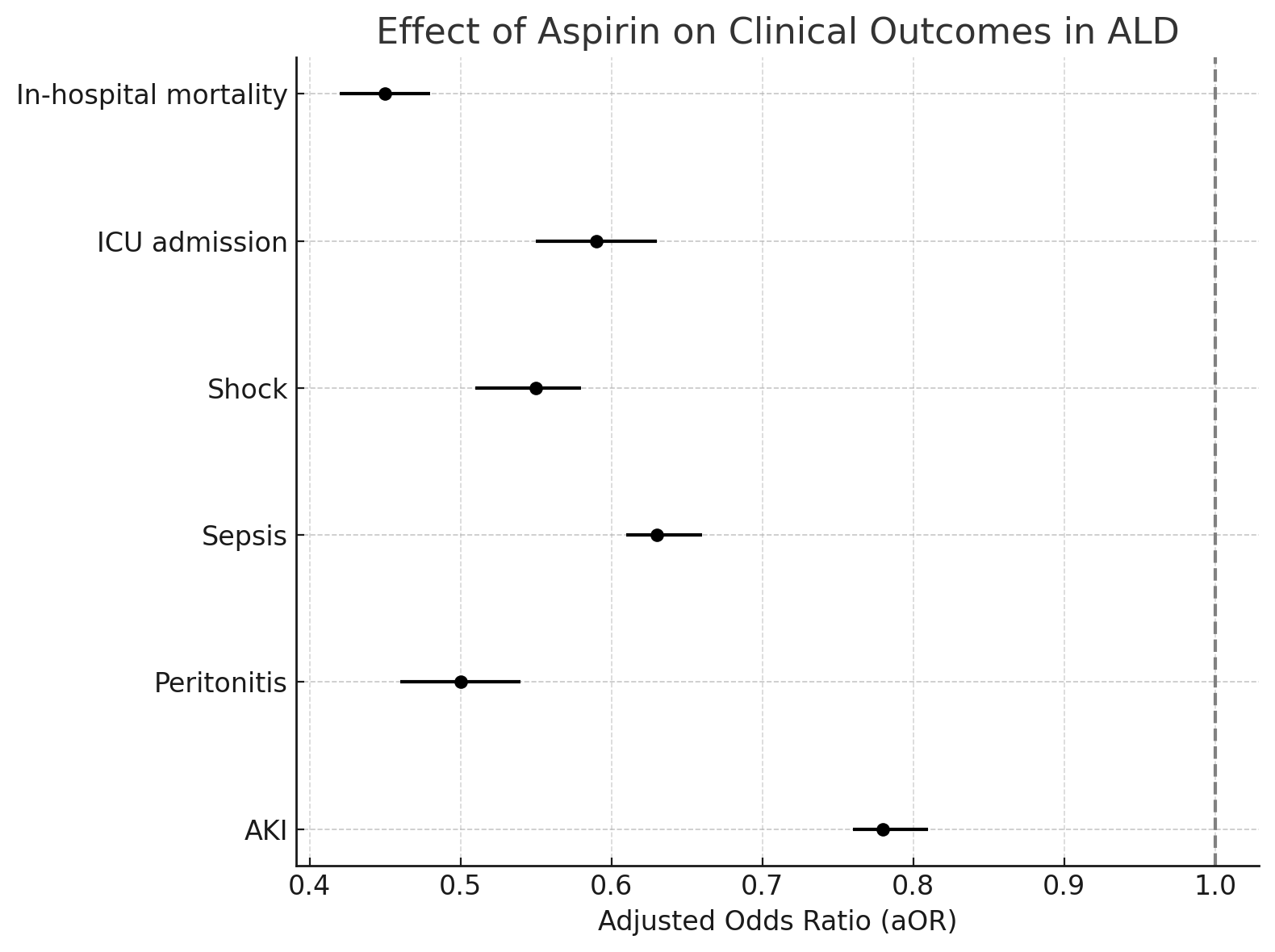Sunday Poster Session
Category: Liver
P1642 - Long-Term Aspirin Use Is Associated with Favorable Clinical Outcomes in Alcohol-Associated Liver Disease: A National Analysis
Sunday, October 26, 2025
3:30 PM - 7:00 PM PDT
Location: Exhibit Hall

Muhamad Oum, MD (he/him/his)
Saint Agnes Medical Center, Fresno CA
Fresno, CA
Presenting Author(s)
Muhamad Oum, MD1, Khalid Aloum, MD2, Bisher Sawaf, MD3, Sammy Saab, MD, MPH4
1Saint Agnes Medical Center, Fresno CA, Fresno, CA; 2SBH Health System, Bronx, NY; 3The University of Toledo, Toledo, OH; 4David Geffen School of Medicine at UCLA, Los Angeles, CA
Introduction: Alcohol-associated liver disease (ALD) is a major driver of liver-related morbidity and mortality in the United States, with limited pharmacologic options to modify its clinical course. Recent studies have demonstrated favorable outcomes with aspirin use in metabolic dysfunction-associated steatotic liver disease (MASLD), attributed to its anti-inflammatory and antiplatelet properties. Given similar mechanisms of injury in ALD we hypothesize that aspirin use may confer comparable benefits in this population. This study evaluates the association between long-term aspirin use and clinical outcomes in ALD using the Nationwide Inpatient Sample.
Methods: We conducted a retrospective cohort study using the Nationwide Inpatient Sample (NIS) data from 2016 to 2021. Patients with ALD were identified using ICD-10 codes and stratified by long-term aspirin use. Demographic variables, hospital characteristics, socioeconomic indicators, and comorbidity burden were collected. The primary outcomes included in-hospital mortality, ICU admission, shock, sepsis, peritonitis, acute kidney injury (AKI), and length of stay (LOS). Multivariable logistic regression was used to assess associations between aspirin use and outcomes, adjusting for potential confounders such as age, sex, race, insurance status, and Charlson Comorbidity Index.
Results: Among 3,303,108 ALD cases, 180,564 (5.47%) were long-term aspirin users. Aspirin users were older (61.5 vs. 53.3 years), predominantly male (78%), and more likely to be White (71%) and Medicare-insured (49%). In adjusted analyses, aspirin use was associated with significantly lower odds of in-hospital mortality (adjusted odds ratio [aOR] 0.45; 95% CI: 0.42–0.48; p < 0.001), ICU admission (aOR 0.59; 95% CI: 0.55–0.63; p < 0.001), shock (aOR 0.55; 95% CI: 0.51–0.58; p < 0.001), sepsis (aOR 0.63; 95% CI: 0.61–0.66; p < 0.001), peritonitis (aOR 0.50; 95% CI: 0.46–0.54; p < 0.001), and AKI (aOR 0.78; 95% CI: 0.76–0.81; p < 0.001). Aspirin users also had a shorter LOS (5.5 vs. 6.2 days; p < 0.001).
Discussion: In this large national cohort, long-term aspirin use was associated with significantly improved clinical outcomes in patients with ALD, including reduced mortality and critical illness. Despite a higher comorbidity burden, aspirin users experienced better outcomes. These findings support the potential therapeutic role of aspirin in ALD and emphasise the need for prospective studies to further evaluate its efficacy and safety in this high-risk population.

Figure: Effect of Aspirin on Clinical Outcomes in ALD
Disclosures:
Muhamad Oum indicated no relevant financial relationships.
Khalid Aloum indicated no relevant financial relationships.
Bisher Sawaf indicated no relevant financial relationships.
Sammy Saab: abbvie – Speakers Bureau. eton – Advisor or Review Panel Member. gilead – Advisor or Review Panel Member, Advisory Committee/Board Member, Consultant, Speakers Bureau. ipsen – Advisor or Review Panel Member, Advisory Committee/Board Member, Speakers Bureau. kezar – Advisory Committee/Board Member. madrigal – Advisor or Review Panel Member, Advisory Committee/Board Member, Speakers Bureau. orphalan – Advisory Committee/Board Member. salix – Advisory Committee/Board Member, Speakers Bureau.
Muhamad Oum, MD1, Khalid Aloum, MD2, Bisher Sawaf, MD3, Sammy Saab, MD, MPH4. P1642 - Long-Term Aspirin Use Is Associated with Favorable Clinical Outcomes in Alcohol-Associated Liver Disease: A National Analysis, ACG 2025 Annual Scientific Meeting Abstracts. Phoenix, AZ: American College of Gastroenterology.
1Saint Agnes Medical Center, Fresno CA, Fresno, CA; 2SBH Health System, Bronx, NY; 3The University of Toledo, Toledo, OH; 4David Geffen School of Medicine at UCLA, Los Angeles, CA
Introduction: Alcohol-associated liver disease (ALD) is a major driver of liver-related morbidity and mortality in the United States, with limited pharmacologic options to modify its clinical course. Recent studies have demonstrated favorable outcomes with aspirin use in metabolic dysfunction-associated steatotic liver disease (MASLD), attributed to its anti-inflammatory and antiplatelet properties. Given similar mechanisms of injury in ALD we hypothesize that aspirin use may confer comparable benefits in this population. This study evaluates the association between long-term aspirin use and clinical outcomes in ALD using the Nationwide Inpatient Sample.
Methods: We conducted a retrospective cohort study using the Nationwide Inpatient Sample (NIS) data from 2016 to 2021. Patients with ALD were identified using ICD-10 codes and stratified by long-term aspirin use. Demographic variables, hospital characteristics, socioeconomic indicators, and comorbidity burden were collected. The primary outcomes included in-hospital mortality, ICU admission, shock, sepsis, peritonitis, acute kidney injury (AKI), and length of stay (LOS). Multivariable logistic regression was used to assess associations between aspirin use and outcomes, adjusting for potential confounders such as age, sex, race, insurance status, and Charlson Comorbidity Index.
Results: Among 3,303,108 ALD cases, 180,564 (5.47%) were long-term aspirin users. Aspirin users were older (61.5 vs. 53.3 years), predominantly male (78%), and more likely to be White (71%) and Medicare-insured (49%). In adjusted analyses, aspirin use was associated with significantly lower odds of in-hospital mortality (adjusted odds ratio [aOR] 0.45; 95% CI: 0.42–0.48; p < 0.001), ICU admission (aOR 0.59; 95% CI: 0.55–0.63; p < 0.001), shock (aOR 0.55; 95% CI: 0.51–0.58; p < 0.001), sepsis (aOR 0.63; 95% CI: 0.61–0.66; p < 0.001), peritonitis (aOR 0.50; 95% CI: 0.46–0.54; p < 0.001), and AKI (aOR 0.78; 95% CI: 0.76–0.81; p < 0.001). Aspirin users also had a shorter LOS (5.5 vs. 6.2 days; p < 0.001).
Discussion: In this large national cohort, long-term aspirin use was associated with significantly improved clinical outcomes in patients with ALD, including reduced mortality and critical illness. Despite a higher comorbidity burden, aspirin users experienced better outcomes. These findings support the potential therapeutic role of aspirin in ALD and emphasise the need for prospective studies to further evaluate its efficacy and safety in this high-risk population.

Figure: Effect of Aspirin on Clinical Outcomes in ALD
Disclosures:
Muhamad Oum indicated no relevant financial relationships.
Khalid Aloum indicated no relevant financial relationships.
Bisher Sawaf indicated no relevant financial relationships.
Sammy Saab: abbvie – Speakers Bureau. eton – Advisor or Review Panel Member. gilead – Advisor or Review Panel Member, Advisory Committee/Board Member, Consultant, Speakers Bureau. ipsen – Advisor or Review Panel Member, Advisory Committee/Board Member, Speakers Bureau. kezar – Advisory Committee/Board Member. madrigal – Advisor or Review Panel Member, Advisory Committee/Board Member, Speakers Bureau. orphalan – Advisory Committee/Board Member. salix – Advisory Committee/Board Member, Speakers Bureau.
Muhamad Oum, MD1, Khalid Aloum, MD2, Bisher Sawaf, MD3, Sammy Saab, MD, MPH4. P1642 - Long-Term Aspirin Use Is Associated with Favorable Clinical Outcomes in Alcohol-Associated Liver Disease: A National Analysis, ACG 2025 Annual Scientific Meeting Abstracts. Phoenix, AZ: American College of Gastroenterology.
